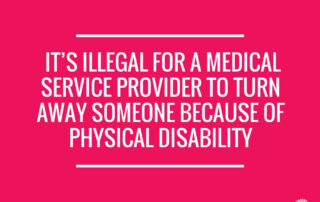What’s Underneath – Jillian Mercado
Jillian Mercado, the 23 year old model and editor and founder of Manufactured 1987 is featured in StyleLikeU 's "What's Underneath Project". The "What's Underneath Project" has select individuals remove their clothes to honor how style is not the clothes you wear, but rather, what's underneath. Transcript Off camera. StyleLikeU: So you should just talk very freely, don’t edit. Just, you know, we’ll edit and just let yourself just roll. You’ll, whoever ask the question you can talk to. At the end of each question you’ll just take a piece of clothing off. Jillian Mercado Voice: Ok, I have one,
Kids’ Mobility Devices Just Got Cooler
A Fun Alternative to Children's Mobility Devices
Doll Diversity Isn’t Just Child’s Play – Dolls with Disabilities
As a little girl, I had a doll collection that took over nearly every inch of toy storage space in my room. I loved them all, especially my two most prized dolls - a My Twinn Doll and a My American Girl Doll, both made to look "just like me." And there was a indeed a striking resemblance between me and the dolls. We had matching brown hair, brown eyes, glasses, and even a matching freckle above our lips. There's just one thing that didn't quite match: my dolls stood upright in their plastic doll stands while I sat in
Pro Infirmis Mannequins Video Shows Bodily Diversity is Beautiful
A trip to the mall bombards me with unattainable ideals of “perfection” everywhere I turn. Mannequins of one standard body shape and size taunt me in each store I enter, all of them wearing clothing that won’t look anything on me like it does on them. Their plastic bodies are tall and thin; I am less than 5 feet with more than my fair share of curves. They stand in casual poses; I am sitting in my wheelchair. To me, mannequins are not always inviting displays. Instead, they’re nothing more than sculptures of a supposedly idyllic body type that I
Doctors across America turning away patients with disabilities, study finds
by Sarah Levis Disabled people in several American cities are going without specialist care because of medical facilities that aren’t physically accessible, says a study that recently appeared in the Annals of Medicine. According to the Americans with Disabilities Act, it’s illegal for a medical service provider to turn away someone because of physical disability. Yet in Boston alone, more than one in six doctors refused to schedule appointments for people posing as patients in wheelchairs. Similar findings were reported in three other cities. The study reported similar findings in in Houston, Texas, Dallas, Texas, and Portland, Oregon. The study



